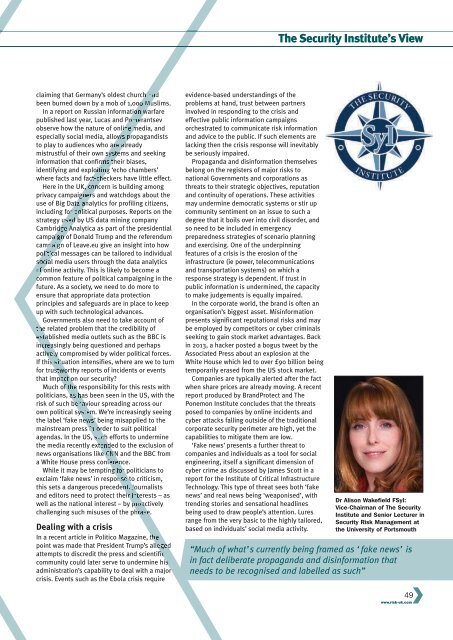RiskUKApril2017
You also want an ePaper? Increase the reach of your titles
YUMPU automatically turns print PDFs into web optimized ePapers that Google loves.
The Security Institute’s View<br />
claiming that Germany’s oldest church had<br />
been burned down by a mob of 1,000 Muslims.<br />
In a report on Russian information warfare<br />
published last year, Lucas and Pomerantsev<br />
observe how the nature of online media, and<br />
especially social media, allows propagandists<br />
to play to audiences who are already<br />
mistrustful of their own systems and seeking<br />
information that confirms their biases,<br />
identifying and exploiting ‘echo chambers’<br />
where facts and fact-checkers have little effect.<br />
Here in the UK, concern is building among<br />
privacy campaigners and watchdogs about the<br />
use of Big Data analytics for profiling citizens,<br />
including for political purposes. Reports on the<br />
strategy used by US data mining company<br />
Cambridge Analytica as part of the presidential<br />
campaign of Donald Trump and the referendum<br />
campaign of Leave.eu give an insight into how<br />
political messages can be tailored to individual<br />
social media users through the data analytics<br />
of online activity. This is likely to become a<br />
common feature of political campaigning in the<br />
future. As a society, we need to do more to<br />
ensure that appropriate data protection<br />
principles and safeguards are in place to keep<br />
up with such technological advances.<br />
Governments also need to take account of<br />
the related problem that the credibility of<br />
established media outlets such as the BBC is<br />
increasingly being questioned and perhaps<br />
actively compromised by wider political forces.<br />
If this situation intensifies, where are we to turn<br />
for trustworthy reports of incidents or events<br />
that impact on our security?<br />
Much of the responsibility for this rests with<br />
politicians, as has been seen in the US, with the<br />
risk of such behaviour spreading across our<br />
own political system. We’re increasingly seeing<br />
the label ‘fake news’ being misapplied to the<br />
mainstream press in order to suit political<br />
agendas. In the US, such efforts to undermine<br />
the media recently extended to the exclusion of<br />
news organisations like CNN and the BBC from<br />
a White House press conference.<br />
While it may be tempting for politicians to<br />
exclaim ‘fake news’ in response to criticism,<br />
this sets a dangerous precedent. Journalists<br />
and editors need to protect their interests – as<br />
well as the national interest – by proactively<br />
challenging such misuses of the phrase.<br />
Dealing with a crisis<br />
In a recent article in Politico Magazine, the<br />
point was made that President Trump’s alleged<br />
attempts to discredit the press and scientific<br />
community could later serve to undermine his<br />
administration’s capability to deal with a major<br />
crisis. Events such as the Ebola crisis require<br />
evidence-based understandings of the<br />
problems at hand, trust between partners<br />
involved in responding to the crisis and<br />
effective public information campaigns<br />
orchestrated to communicate risk information<br />
and advice to the public. If such elements are<br />
lacking then the crisis response will inevitably<br />
be seriously impaired.<br />
Propaganda and disinformation themselves<br />
belong on the registers of major risks to<br />
national Governments and corporations as<br />
threats to their strategic objectives, reputation<br />
and continuity of operations. These activities<br />
may undermine democratic systems or stir up<br />
community sentiment on an issue to such a<br />
degree that it boils over into civil disorder, and<br />
so need to be included in emergency<br />
preparedness strategies of scenario planning<br />
and exercising. One of the underpinning<br />
features of a crisis is the erosion of the<br />
infrastructure (ie power, telecommunications<br />
and transportation systems) on which a<br />
response strategy is dependent. If trust in<br />
public information is undermined, the capacity<br />
to make judgements is equally impaired.<br />
In the corporate world, the brand is often an<br />
organisation’s biggest asset. Misinformation<br />
presents significant reputational risks and may<br />
be employed by competitors or cyber criminals<br />
seeking to gain stock market advantages. Back<br />
in 2013, a hacker posted a bogus tweet by the<br />
Associated Press about an explosion at the<br />
White House which led to over £90 billion being<br />
temporarily erased from the US stock market.<br />
Companies are typically alerted after the fact<br />
when share prices are already moving. A recent<br />
report produced by BrandProtect and The<br />
Ponemon Institute concludes that the threats<br />
posed to companies by online incidents and<br />
cyber attacks falling outside of the traditional<br />
corporate security perimeter are high, yet the<br />
capabilities to mitigate them are low.<br />
‘Fake news’ presents a further threat to<br />
companies and individuals as a tool for social<br />
engineering, itself a significant dimension of<br />
cyber crime as discussed by James Scott in a<br />
report for the Institute of Critical Infrastructure<br />
Technology. This type of threat sees both ‘fake<br />
news’ and real news being ‘weaponised’, with<br />
trending stories and sensational headlines<br />
being used to draw people’s attention. Lures<br />
range from the very basic to the highly tailored,<br />
based on individuals’ social media activity.<br />
Dr Alison Wakefield FSyI:<br />
Vice-Chairman of The Security<br />
Institute and Senior Lecturer in<br />
Security Risk Management at<br />
the University of Portsmouth<br />
“Much of what’s currently being framed as ‘fake news’ is<br />
in fact deliberate propaganda and disinformation that<br />
needs to be recognised and labelled as such”<br />
49<br />
www.risk-uk.com

















